 Sasha Frere-Jones
Sasha Frere-Jones
A 1979 Linton Kwesi Johnson documentary by Franco Rosso is a portrait of the artist as principled activist.
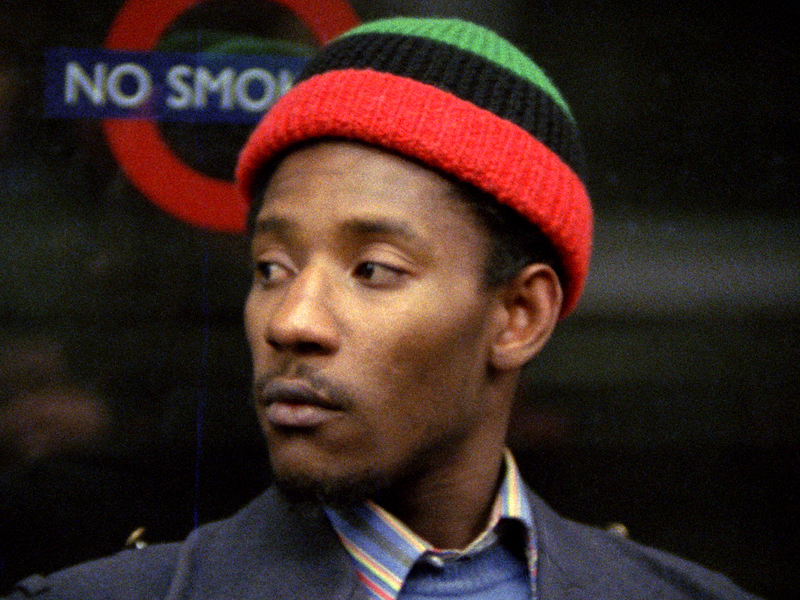
Linton Kwesi Johnson in Dread Beat an Blood. Courtesy Seventy-Seven.
Dread Beat an Blood, directed by Franco Rosso, screening Saturday, September 20, 2025, at Brooklyn Academy of Music,
30 Lafayette Avenue, Brooklyn
• • •
Linton Kwesi Johnson, the subject of Dread Beat an Blood, Franco Rosso’s forty-five-minute 1979 documentary, created something he called “dub lyricism,” which bears a gloss. Dub is what happens to reggae when you remove the vocals and massage the instrumental elements, often with the aid of echo. Johnson’s version of poetry, which he later recorded as music, began in the early ’70s as a version of dub itself. His poems feel like basslines, and though you might think that vocals added back to dub would simply constitute reggae, that’s not the case. Johnson doesn’t sing, and his poems certainly aren’t what ended up being called toasting or deejaying (the Jamaican siblings of rap). “Dub lyricism” is specific to Johnson and a few others, like Mutabaruka and Michael Smith, all of whom presented explicit political engagements.
I discovered dub because Johnson’s 1980 album LKJ In Dub found me in a record store. It found me in the sense that the enormous black sans-serif type on a red background was clickbait before the internet—so big you had to pick it up, somewhere between a twenty-dollar bill on the ground and Robert Indiana’s LOVE sculpture. The titles called to me—“Brain Smashing Dub” and “Iron Bar Dub” and, most importantly, “Reality Dub.” Johnson’s song-poems—the material he was dubbing out here, recursively—introduced a naive American teenager to police violence. “Sonny’s Lettah (Anti-Sus Poem)” is a poem to a mother from a son—Sonny—who has ended up in prison after killing the cop who was beating his brother, Jim. Watching Rosso’s too-brief gem, some forty-five years later, I realized that my frustration with American musicians over the last two years, silent during a genocide they pay for, has its roots in watching Johnson work and believing that principled stances can coexist with a recording career.
In the last words of the documentary, Johnson explains the contradictions inherent to political music. He says, “I don’t believe that poetry changes anything,” and then, “I don’t believe that art changes anything.” This makes sense for a young Jamaican who went to London in the early ’60s and joined the British Black Panthers, with no intention of making records. Johnsons adds that “a thousand songs depicting the most terrifying conditions of human existence” will not speed the revolution. “It’s people’s actual material struggle to change those conditions—that brings about political change.”
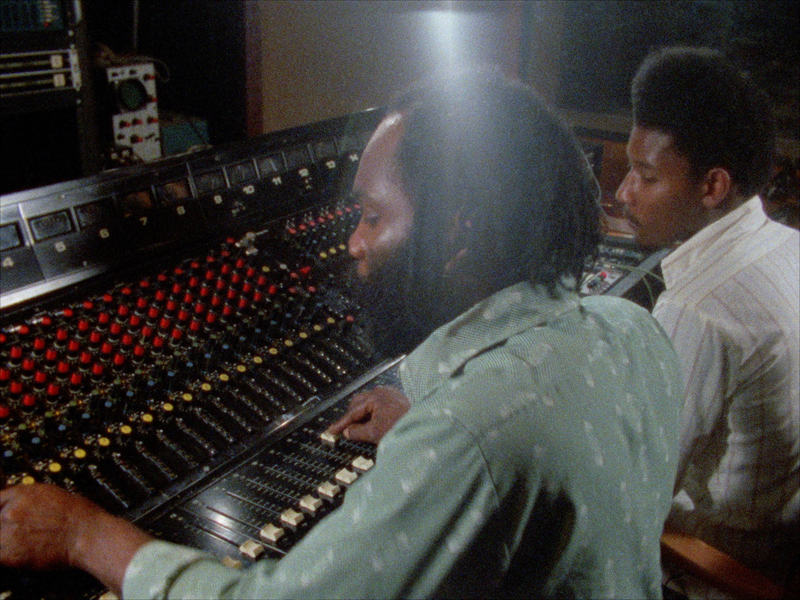
Dennis Bovell and Linton Kwesi Johnson in Dread Beat an Blood. Courtesy Seventy-Seven.
Johnson’s work has always been an index of the world around him. Rosso shows him in the offices of Race Today, where Johnson was the arts editor. He talks about the magazine as being “at the forefront of a Black struggle in this country.” Johnson explains that he is “actively involved in politics in a political organization,” and that “many of the things which inspire me to write my poetry are things which affect me and my class.”
He says only a few things about music in Rosso’s movie, but we see extensive footage of Johnson recording his first album, Dread Beat an Blood, which set poems from his 1975 book of that name to dub rhythms. It was recorded with producer Dennis Bovell, whom Johnson said was “the only recording engineer who knew how to record reggae properly, to get the drum and bass sound right.” Half of the band are childhood friends who went to Tulse Hill School with Johnson, nonprofessionals who rarely played without him. Critics didn’t understand what was going on here. Look how Johnson’s second album, Forces of Victory, was received when it was released the following year, in 1979. Critic Robert Christgau wrote that “you have every right to be suspicious of a Jamaican-English intellectual who writes message poems in patois and then sing-speaks them with the support of top reggae professionals.” This is in a largely positive review appended to an A-minus grade, mind you. “Suspicion” was, in fact, the quasi-legal pretext Johnson and other young Black people in Britain were fighting, the “sus” in his “Anti-Sus Poem.”
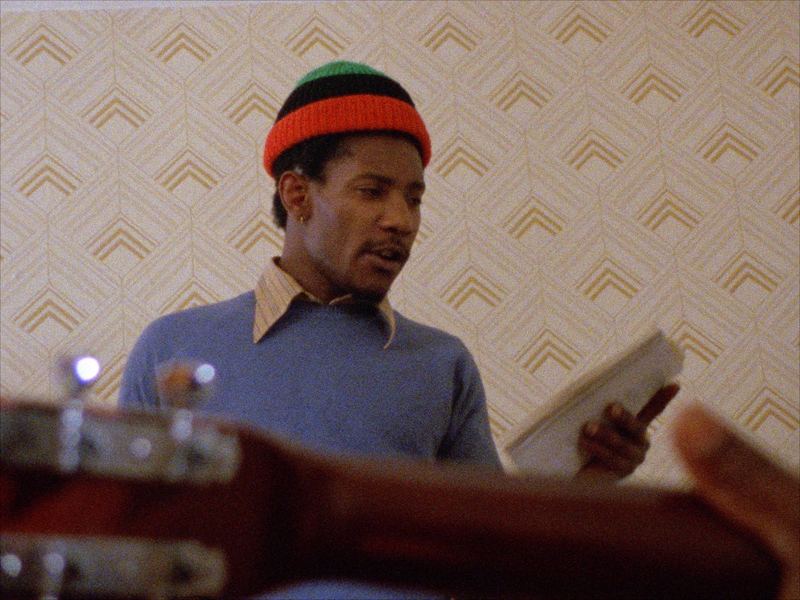
Linton Kwesi Johnson in Dread Beat an Blood. Courtesy Seventy-Seven.
Rosso’s film shows you how stylish and calm Johnson is in the face of suspicion. You’ll see some excellent diagonal stripes and an omnipresent beanie in the colors of the Jamaican flag. Johnson is always one person here, talking evenly and with force both onstage and in conversation with the students of Tulse Hill. After reading “Doun de Road,” a poem about clashes with the racist thugs of the National Front, who are “making fire-bombs for Burnley,” Johnson tells the students to question him. When asked if his poems have a “message,” he answers that his poetry is “being more or less a way of seeing things.”
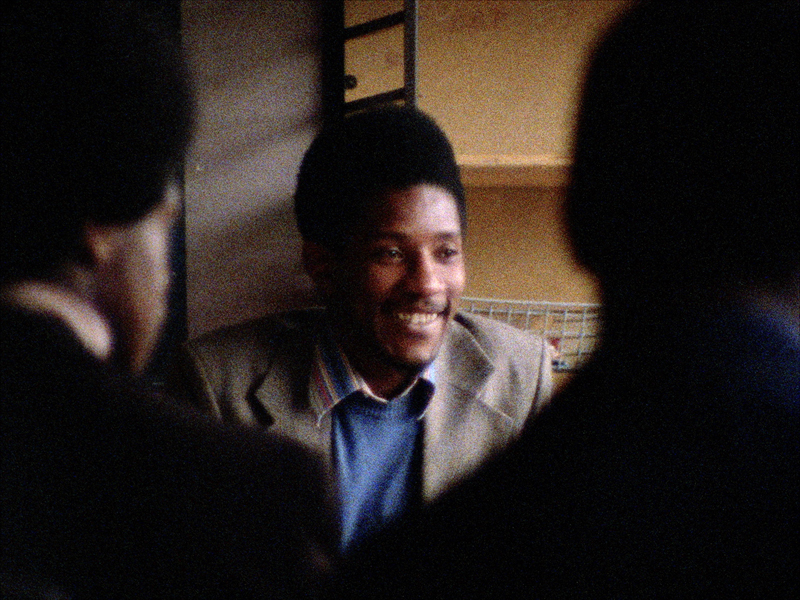
Linton Kwesi Johnson in Dread Beat an Blood. Courtesy Seventy-Seven.
Johnson lights up when he tells the story of his own conditions. After working as a salesman and a civil servant, he got into Goldsmiths. “I left with my honors degree in sociology in 1973 and found I couldn’t get a job,” Johnson says. “Nothing.” He leaned into making music and did a stint at a factory before being employed by the Keskidee Art Centre. We see Johnson and a handful of young men smoking and talking around a table, comfortably but without any jollity. Johnson says he has a “good relationship” with the youth, many of whom “have grievances against the police for wrong conviction and being picked up” on “sus law” charges.
The specific name of the statute is Suspicion Of Loitering With Intent To Commit A Felony, a mandate for London police to harass young people of color. One man describes the police breaking up a “blues dance” and making everyone line up against the wall.
“Do you think that when English people decide that we going to have a little social get-together, have a party, anything,” Johnson asks, “you think that the police have that kind of attitude to them?”
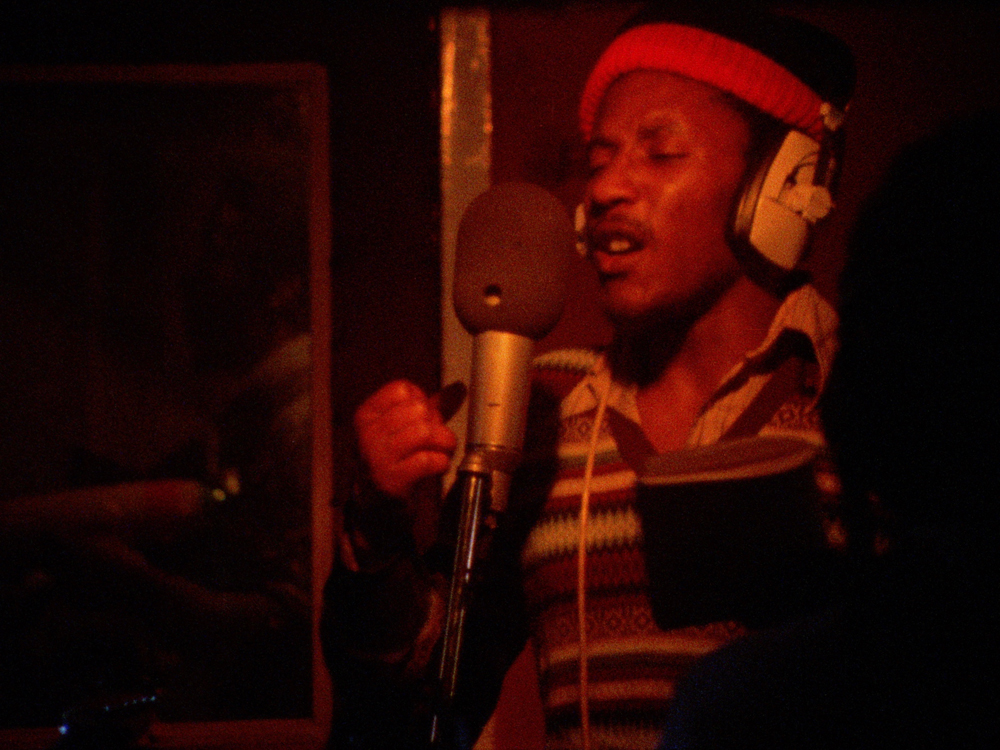
Linton Kwesi Johnson in Dread Beat an Blood. Courtesy Seventy-Seven.
The picture ends with not one but three recitations of “It Dread Inna Inglan (for George Lindo),” once as the recorded song and twice as poetry. Lindo was wrongly convicted of robbery, even after four white colleagues testified that he had been at work and couldn’t have committed the crime. We see protestors standing outside the jail where he was being held, before his two-year prison sentence was set to begin. This public pressure worked, and Lindo was released after a year in prison with a £24,275 settlement. I wonder what is keeping musicians from applying this kind of pressure to their own government now, but perhaps it is the American suspicion of discussing material conditions as anything other than ideological projections. There was a time when it seemed a homegrown dub lyricism might be able to fight Anglo imperialism, but that moment came and went with the twentieth century.
Sasha Frere-Jones is a musician and writer from New York. His memoir, Earlier, was recently published by Semiotext(e).